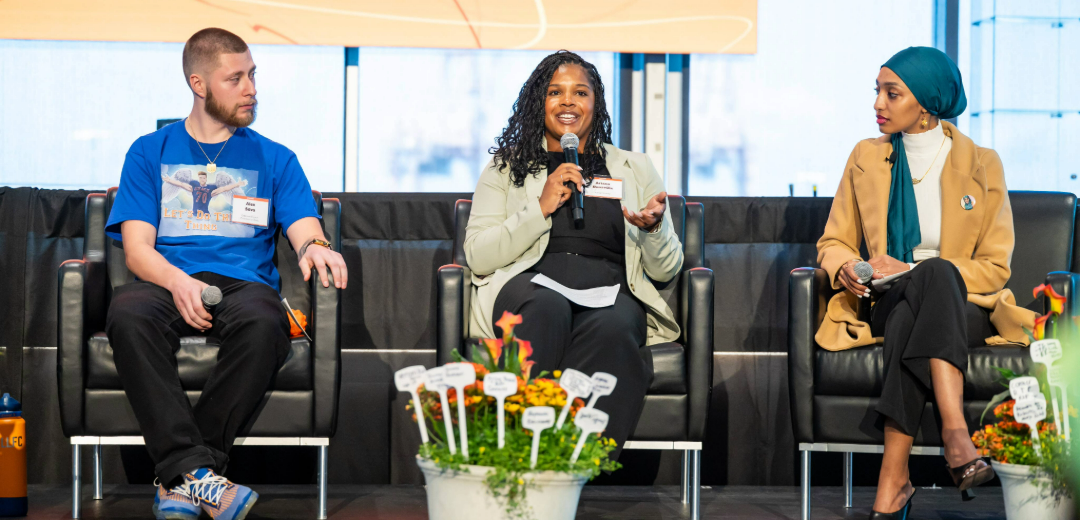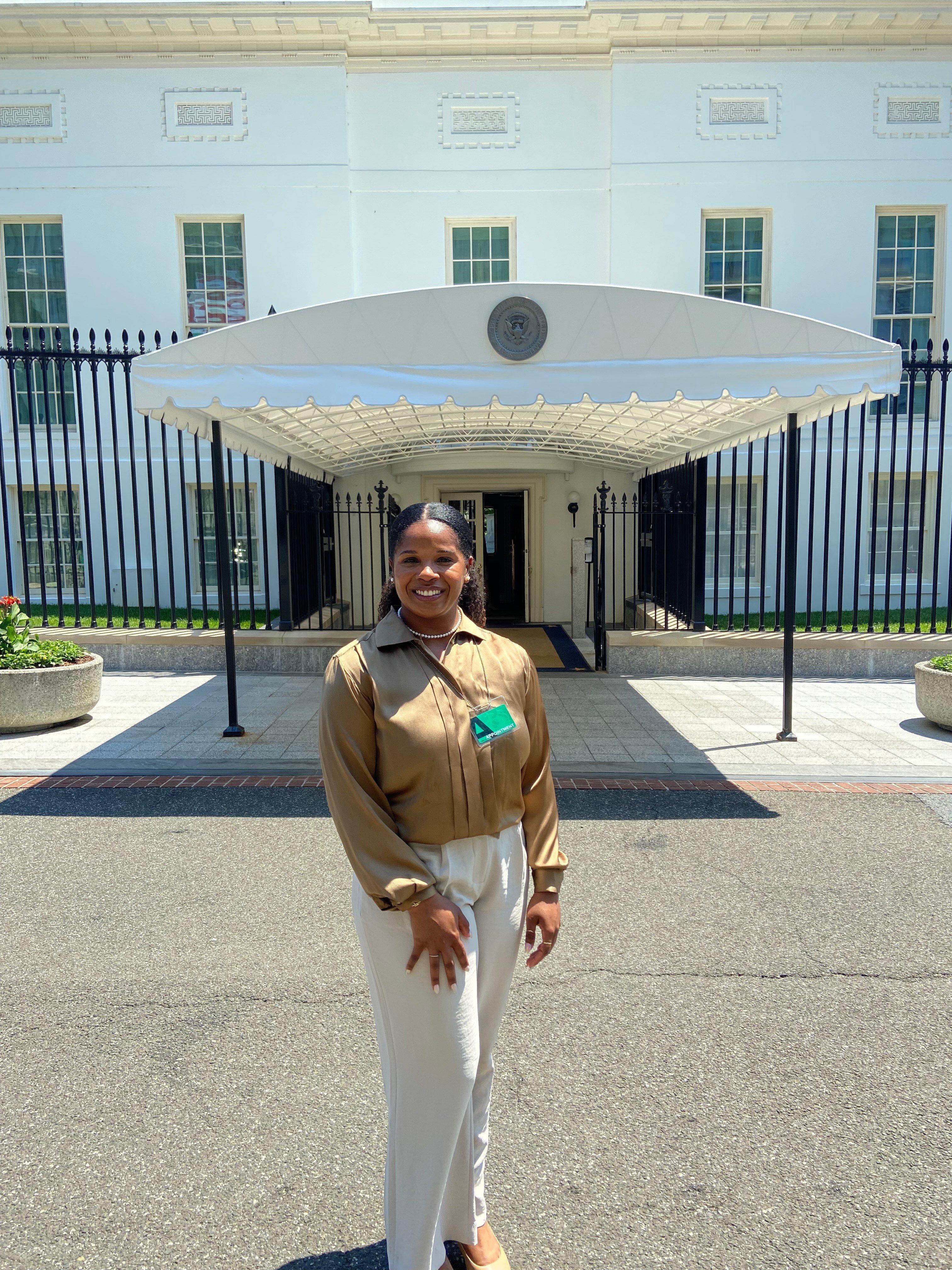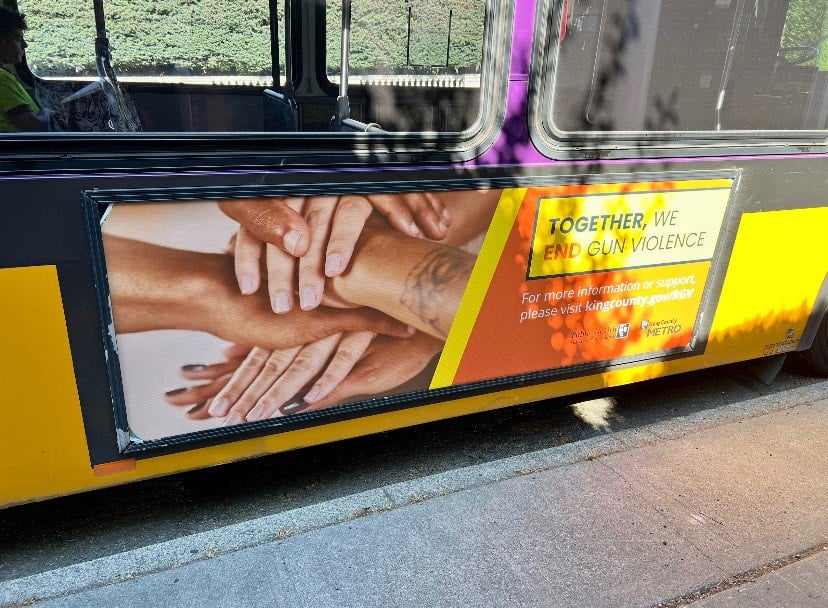
A month into her role managing communications related to gun violence prevention efforts in King County, Washington, Ariana Donaville spoke at the parole hearing for the person who killed her mother.
Donaville was just seven years old when she lost her mom to gun violence. She and her family have attended several parole hearings in the years since, providing victim impact statements. She said this hearing felt different, as she began to deeply connect the person’s story with the work she is doing, and understand how early intervention and resources might have steered them away from violence and prevented her mother from being killed.
“Here in King County, we say gun violence is preventable; it’s not inevitable. Sitting in that parole hearing, I realized this could have been preventable,” Donaville said. “A lot of the times, we focus on what happened . . . We don’t always think about it from a position of how we could have stopped that from happening . . . To have sat through the hearing and to have heard that person’s story and connect those dots was really the moment I knew I was in this work for a reason.”
She said her work has also helped her to feel more seen and understood in her lived experience—something not many people in her life can relate to.
“My mother was the first person in my family to die from unnatural causes . . . The women in our family live long lives, so to experience that was very traumatic to the family . . . I never felt like I had people who understood my experience in losing my mom to gun violence because none of my family or friends could relate . . . None of my peers could relate . . . And so when I started this role, I felt very seen.”
 Donaville, BS '17 (public relations), MS '20 (strategic communication), joined King County in 2022 and today works as communications director for the Regional Office of Gun Violence Prevention. As part of the inaugural team for the office, her role focuses on storytelling, raising awareness of gun violence as a public health issue, and elevating the work of community-led organizations implementing community violence intervention services and strategies.
Donaville, BS '17 (public relations), MS '20 (strategic communication), joined King County in 2022 and today works as communications director for the Regional Office of Gun Violence Prevention. As part of the inaugural team for the office, her role focuses on storytelling, raising awareness of gun violence as a public health issue, and elevating the work of community-led organizations implementing community violence intervention services and strategies.
In just three years, she has been an integral part of her team's tremendous impact —helping orchestrate the annual Together We End Gun Violence Conference each June; distributing free gun lock boxes through annual National Gun Violence Awareness Day Gun Lockbox Giveaway events in partnership with the Public Health - Seattle & King County Lock-It-Up Program; coordinating several elements of King County’s 100 Days of Action Against Gun Violence in 2024 which included the distribution of over 5,000 gun lockboxes across King County; launching a comic series that highlights community violence intervention; supporting community organizations that provide life-affirming care to young people at the highest risk of experiencing gun violence; and even visiting the White House in 2024 to meet with the Biden administration’s National Office of Gun Violence Prevention through the National Offices of Violence Prevention Network. The work is challenging, heart-wrenching, and purposeful.
“What I tell people is none of us who do this work want to do this work. We don't wake up every day like, ‘this is my dream job.’ I can attest it’s no one's dream job, but somebody has to do it.”

Donaville created a banner promoting gun violence prevention for display on buses across King County.
Donaville said her role requires a great deal of empathy and a solutions-oriented approach—balancing support for those grieving while identifying strategies to prevent the cycle of violence from repeating. It’s a delicate balance in both her work and her personal life—holding space for her and her family’s grief, as well as for the lack of supports in the life of the person who killed her mom—supports she says could have prevented the tragedy.
“I can’t sit in the mindset of this was a bad person because I don’t think that at all,” Donaville said.
At the same time, Donaville has experienced firsthand the grief caused by gun violence and witnessed the grief of her grandmother and aunt, who raised her. The work she does today is driven by a desire to prevent that trauma for other families.
“I hate that I lost my mom, and I don’t want somebody else to experience that.”
The purpose behind her work energizes Donaville to show up every day ready to contribute to the movement to end gun violence.
"I feel like I am exactly where I’m supposed to be right now, which is a feeling I hope everybody gets to experience at some point in their career. I think a lot of people work jobs for a lot of different reasons, but not everybody can say they truly enjoy the work they’re doing and that it brings them a sense of purpose. I am deeply grateful I can say that about my career, and I'm incredibly thankful to work alongside and learn from leaders in this field with over 30 years of experience.”
Though she’s dedicated her career to violence reduction and intervention, Donaville intentionally maintains life balance as a cornerstone of her well-being. She said this role has taught her how imperative self-care is. For her, that looks like regular walks, hot yoga, and connecting with family and friends. She has completed multiple 75-day walking challenges where she walks three to six miles a day for 75 days straight.
“I have to pour into my cup; I can’t pour from an empty cup. Walking has truly grounded me,” she said. “If there's anything that anybody takes away from this in terms of self-care, go for a walk. You might find joy and discover little gems in your neighborhood.”
In addition to promoting self-care, another key message Donaville shares through her work and to those around her? Be part of the change.
“I believe as humans, we must do our part to create safe spaces for each other and for the generations to come after us,” she said. “Everyone has a role to play in ending gun violence. It may be a big role; it may be a small role. It’s a role nonetheless . . . It could be as simple as locking up your firearm. It can be as simple as joining our movement. I challenge folks to find their role because it truly will take everybody.”
—By April Miller, UO Alumni Association associate director of marketing and communications

